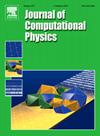Multi-head physics-informed neural networks for learning functional priors and uncertainty quantification
IF 3.8
2区 物理与天体物理
Q2 COMPUTER SCIENCE, INTERDISCIPLINARY APPLICATIONS
引用次数: 0
Abstract
In numerous applications, the integration of prior knowledge and historical information is essential, particularly for tasks requiring the solution of ordinary or partial differential equations (ODEs/PDEs) in data-sparse or noisy environments. For instance, achieving accurate solutions to time-dependent PDEs with limited initial condition measurements necessitates an effective strategy for embedding prior knowledge. Hard-parameter sharing architectures in neural networks (NNs) have demonstrated success in both traditional and scientific machine learning domains, facilitating the learning of informative representations.
In this study, we introduce a novel, yet efficient, method to enhance physics-informed neural networks (PINNs) by incorporating a multi-head structure that enables the learning of functional priors from both empirical data and governing physical laws. This prior information can then be used to address data sparsity and high-level noise in solving ODE/PDE problems with uncertainty quantification (UQ). The approach, termed Multi-Head PINN (MH-PINN), consists of a shared body NN and multiple head NNs, each corresponding to an individual PINN instance. Our framework for functional prior learning is carried out in two stages: (1) training the MH-PINNs to develop a shared body NN alongside multiple head NNs, and (2) employing these trained head NNs to estimate a prior distribution through a normalizing flow-based density estimator.
The learned functional prior can then be applied as a regularization mechanism in deterministic contexts or as an informative prior within a Bayesian inference framework, aiding in the resolution of subsequent ODE/PDE tasks. We evaluate the efficacy of MH-PINNs across five benchmark problems, including a high-dimensional parametric PDE, all characterized by data sparsity or substantial noise levels. Our findings reveal that MH-PINNs deliver accurate solutions and robust UQ, demonstrating adaptability across a range of complex and challenging scenarios.
用于学习功能先验和不确定性量化的多头物理信息神经网络
在许多应用中,先验知识和历史信息的集成是必不可少的,特别是对于需要在数据稀疏或噪声环境中求解常微分方程或偏微分方程(ode /PDEs)的任务。例如,要在有限的初始条件测量下获得时间相关偏微分方程的精确解,就需要一种有效的嵌入先验知识的策略。神经网络中的硬参数共享架构在传统和科学机器学习领域都取得了成功,促进了信息表示的学习。在本研究中,我们引入了一种新颖而有效的方法,通过结合多头结构来增强物理信息神经网络(pinn),该结构能够从经验数据和控制物理定律中学习功能先验。在不确定性量化(UQ)解决ODE/PDE问题时,这些先验信息可用于解决数据稀疏性和高水平噪声问题。这种方法被称为多头PINN (MH-PINN),由一个共享主体NN和多个头部NN组成,每个头部NN对应一个单独的PINN实例。我们的功能先验学习框架分两个阶段进行:(1)训练mh - pin以与多个头部NN一起开发共享体NN,以及(2)使用这些训练好的头部NN通过归一化流密度估计器来估计先验分布。然后,学习到的功能先验可以作为确定性上下文中的正则化机制或作为贝叶斯推理框架中的信息先验,帮助解决后续的ODE/PDE任务。我们评估了mh - pinn在五个基准问题上的有效性,包括一个高维参数PDE,所有这些问题都以数据稀疏性或大量噪声水平为特征。我们的研究结果表明,mh - pinn提供了准确的解决方案和强大的UQ,展示了在一系列复杂和具有挑战性的情况下的适应性。
本文章由计算机程序翻译,如有差异,请以英文原文为准。
求助全文
约1分钟内获得全文
求助全文
来源期刊

Journal of Computational Physics
物理-计算机:跨学科应用
CiteScore
7.60
自引率
14.60%
发文量
763
审稿时长
5.8 months
期刊介绍:
Journal of Computational Physics thoroughly treats the computational aspects of physical problems, presenting techniques for the numerical solution of mathematical equations arising in all areas of physics. The journal seeks to emphasize methods that cross disciplinary boundaries.
The Journal of Computational Physics also publishes short notes of 4 pages or less (including figures, tables, and references but excluding title pages). Letters to the Editor commenting on articles already published in this Journal will also be considered. Neither notes nor letters should have an abstract.
 求助内容:
求助内容: 应助结果提醒方式:
应助结果提醒方式:


